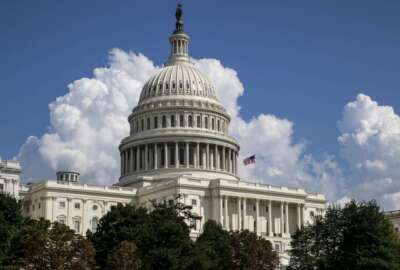

Congressional leaders say they have reached agreement on a plan to pass a stopgap government funding bill through Dec. 7, thereby avoiding a partial government...
Updated Sept. 14, 2018, at 9:46 a.m.
Senate and House appropriations committees agreed on the conference report for the second of three “minibus” bills for 2019. The package covers spending for the departments of Defense, Labor and Education.
Together the three bills fund roughly 90 percent of annual spending. A short-term solution for a portion of the government including the Homeland Security Department, which would oversee President Donald Trump’s planned U.S.-Mexico border wall, has yet to be determined.
But in light of the threat of Hurricane Florence on the eastern seaboard, congressional leaders moved up the vote from Thursday to Wednesday, the Associated Press reported.
“The defense and labor/HHS bills account for the lion’s share of discretionary spending as just about everybody here knows. Pairing these two bills together was the lynchpin of our strategy to pass appropriations bills in the Senate,” Senate Appropriations Committee Chairman Richard Shelby (R-Ala.) said ahead of the vote.
The bill includes $674.4 billion for DoD, or $19.8 billion more than was allocated in fiscal 2018. Conferees agreed to $306 million more for cyber research and an additional $417 million to develop enhanced defense capabilities in space, according to news release from the Senate Appropriations Committee.
The bill also provides $178.1 billion in discretionary funding for Labor, Education, HHS and related agencies.
Members said they were pleased the final package had been stripped of divisive partisan riders. Other bill highlights include $2 billion more funding for the National Institutes of Health, $3.8 billion for addressing the opioid epidemic and $70 million more for career and technical education.
Lawmakers also noted their desire to provide more timely and stable DoD funding.
“2009 was the last year that DoD did not have to operate under a continuing resolution,” said Rep. Kay Granger (R-Texas). “We can all be proud to say that the cycle of continuing resolutions stops here and it stops today.”
Sen. Dick Durbin (D-Ill.) put forward an amendment allocating $1 million for HHS to require price information in drug advertisements, an amendment also supported by Sen. Chuck Grassley (R-Iowa). But the measure was withdrawn after several members on both sides said they would not support it given its potential to jeopardize the minibus in the House.
Negotiations are still ongoing for the financial services and general government appropriations bill, The House Appropriations Committee’s press offices could not confirm a timeline for a revised conference report as of Thursday afternoon.
Conferees went into recess before deciding on the report, saying that several “poison pill” riders had yet to be resolved between the House and Senate versions of the bill. The Senate passed their version of the bill last month with a 1.9 percent pay raise for federal civilian employees. This was despite Trump’s recommendation for a pay freeze in 2019.
Lawmakers did not mention the pay raise during Thursday’s conference committee hearing. So far, 182 representatives have voiced support for a 1.9 percent 2019 federal pay raise for civilian employees. The raise would be the same as what civilian employees received last year.
On Sept. 7, 23 Republicans and Democrats wrote to Trump, calling the raises “overdue for our hardworking federal employees” and said they “provide incentives to recruit and retain a strong federal workforce.”
Meanwhile, Congressional leaders say they have reached agreement on a plan to pass a stopgap government funding bill through Dec. 7.
Rep. Rodney Frelinghuysen (R-N.J.) chairman of the House Appropriations Committee, said the measure will allow Congress to complete work on a series of spending measures now being negotiated.
The Senate approved a $147 billion package Wednesday evening to fund the Energy Department, veterans’ programs and the legislative branch. It’s the first of three spending packages Congress hopes to approve this month to avoid an Oct. 1 partial government shutdown. The package awaits a House vote.
The package features a $5.1 billion increase for the Veterans Affairs Department, including $1.1 billion to pay for a law Trump signed in June to give veterans more freedom to see doctors outside the troubled VA system. Lawmakers also approved another $44.6 billion for energy and water programs, the Associated Press first reported. Those programs deal with nuclear stockpile readiness, innovation in energy research, flood-control projects, and regional ports and waterways.
This story will be updated as information becomes available. The Associated Press contributed to the reporting of this story.
Copyright © 2025 Federal News Network. All rights reserved. This website is not intended for users located within the European Economic Area.
Amelia Brust is a digital editor at Federal News Network.
Follow @abrustWFED


